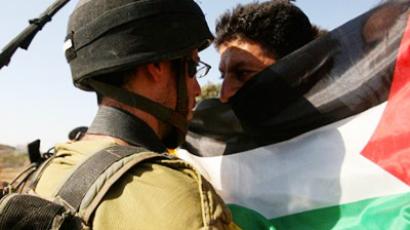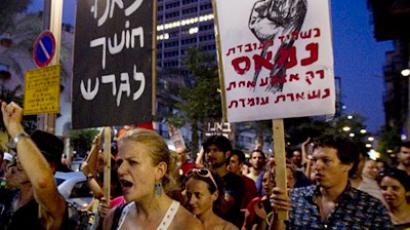Armed ‘welcome’ for Palestinian independence
The Israeli army has launched a program to train civilians for a possible mass Arab uprising or even a third intifada on the West Bank once Palestine announces independence, anticipated in September.
Tear gas and stun grenades are being distributed among local citizens, along with instructions on how to use the munitions if the Palestinian population attempts to bring violence to the streets of districts where Arabs and Jews live together, reports the Haaretz newspaper. Israeli Defense Forces conducted the first “war games” for civilians on Monday with more planned for the future. The newspaper acquired a document showing that Israeli authorities assume that Palestine declaring independence will likely cause a general uprising “which will mainly include mass disorder.”The document also stresses that “extreme cases like shooting from within the demonstrations or even terrorist incidents” are quite possible.Palestine is expected to announce independence at the General Assembly of the United Nations that opens on September 20. That means that starting from September 19 all Israeli public offices will be on high alert.
Israel’s National Emergency Management Authority at the Defense Ministry informed settlers that in case of mass disorder there might be fuel and gas shortages so local authorities have been advised to stock fuel in advance. The owners of grocery stores should increase their supplies of goods while infrastructure elements like water supply systems, electricity installations and communication lines must be patrolled with a vengeance.The National Emergency Management Authority warns the situation of high alert could last for several weeks or more.The Israeli army is also preparing for unrest, obtaining new high-end laser target designation systems for snipers, to make them even more efficient in the wake of possible unrest. However Israeli military command issued instructions to shoot at the kneecaps of rioters to avoid unnecessary casualties, as The Jerusalem Post reports.A “red line” has been drawn around each West Bank settlement and soldiers will get the order to shoot any Palestinian protestors crossing it. On Monday, Israel voiced fears that Hamas might get its hands on arms raided from military depots in Libya. Allegedly, the organization that rules the Gaza sector is already getting thousands of guns and is even supplying the Palestinian authority with anti-tank rocket launchers and anti-aircraft missiles.Israel believes tons of munitions are being carried to Gaza through a system of underground tunnels on the Gaza-Egyptian border.
What anthropologist and political activist Jeff Halper expects to happen in September is not unrest, but a demonstration of Palestinian independence. Halper, who is also a co-founder of the Israeli Committee against House Demolitions, told RT that if the UN indeed acknowledges Palestinian statehood, this will render the Israeli Defense Ministry’s efforts redundant.“If in September the UN recognizes the state of Palestine within the 1967 borders, it will mean that the settlements, the checkpoints, the Israeli wall – everything that Israel has – will become illegal in the sovereign territory of Palestine,” he said. “There will be no legal justification for stopping Palestinians from walking into settlements, from crossing checkpoints. And that is a real concern to Israel, as they will simply ignore the fact that the army is there.”
Peace activist Arik Ascherman, the director of special projects for Rabbis for Human Rights, an NGO, says the main concern is not new weapons the Israeli army may receive, but how the military will use them.“The army already has security personnel almost in every settlement,” Ascherman told RT. “We could say it is even better that they are going to get some tear gas in addition to their lethal weapons. But the problem is, even today security officers often overstep their bounds and abuse their authority.”














